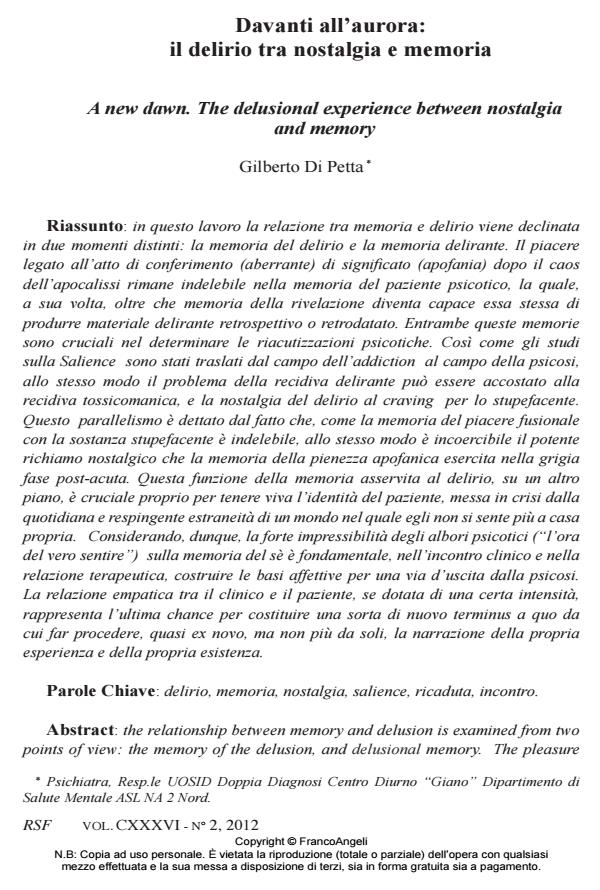Davanti all’aurora: il delirio tra nostalgia e memoria
Journal title RIVISTA SPERIMENTALE DI FRENIATRIA
Author/s Gilberto Di Petta
Publishing Year 2012 Issue 2012/2
Language Italian Pages 16 P. 137-152 File size 1633 KB
DOI 10.3280/RSF2012-002008
DOI is like a bar code for intellectual property: to have more infomation
click here
Below, you can see the article first page
If you want to buy this article in PDF format, you can do it, following the instructions to buy download credits

FrancoAngeli is member of Publishers International Linking Association, Inc (PILA), a not-for-profit association which run the CrossRef service enabling links to and from online scholarly content.
The relationship between memory and delusion is examined from two points of view: the memory of the delusion, and delusional memory. The pleasure arising from conferring (an aberrant) meaning (apophania) to life, after the chaos of a psychotic crisis, remains impressed on the patient’s mind. Furthermore, the recollection of the revelation may also produce delirious flashbacks. Both types of memories can become predictive of an impending psychotic relapse. As for the notion of salience it was taken over by psychiatry from the field of addiction. Accordingly an addictive relapse can be compared to a delusional relapse and drug craving to the nostalgia for delusion. When comparing the enduring memory of the pleasure given by drugs with the powerful memories of a delusional experience, the parallelism between the two fields of study appears evident. On another level, memory subservient to delusion plays an essential role in upholding the patient’s identity when the latter has been disrupted and the person experiences an alien world in which he or she no longer feels at home. Considering the strong impact of the early psychotic experience, "the time of real feeling", on the patient’s self, it is fundamental that the clinical encounter and the therapeutic relationship provide an emotional framework to smooth the progress towards recovery. The intense empathic relationship between clinician and patient constitutes the patient’s last chance to find, with the therapist, a new starting point from which to build, almost from scratch, the narrative of his experience and life.
Keywords: Delusion, memory, nostalgia, salience, relapse, encounter
Gilberto Di Petta, Davanti all’aurora: il delirio tra nostalgia e memoria in "RIVISTA SPERIMENTALE DI FRENIATRIA" 2/2012, pp 137-152, DOI: 10.3280/RSF2012-002008